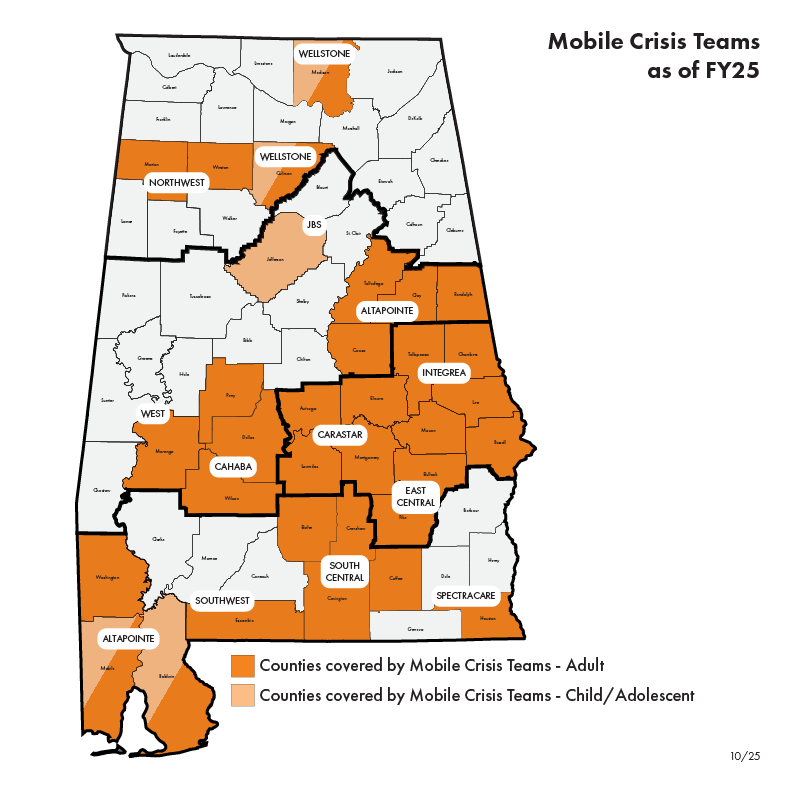In our state, 67 counties, 55 are deemed “rural”. Many communities, families, and individuals reside in rural areas without the ability to easily travel to a Crisis Center or a community mental health center if a crisis should occur.
In order to actively change the model of care and respond to this vital need, the Alabama Department of Mental Health has expanded the Alabama Crisis System of Care to include Mobile Crisis Teams (MCT).
In Fiscal Year (FY) 2021, with a foundational investment and support of Governor Ivey and the Legislature, five community mental health centers (CMHC) were funded to initiate rural crisis programs and mobile crisis teams:
- Cahaba Center for Mental Health – Dallas, Perry and Wilcox Counties
- Northwest Alabama Mental Health Center – Marion and Winston Counties
- Southwest Alabama Behavioral Health Care Systems – Escambia County
- WellStone – Cullman County
- West Alabama Mental Health Center – Marengo County
Two additional CMHCs were awarded funds through FY 21 federal ARPA and Block Grant awards:
- South Central Mental Health Center – Covington County
- SpectraCare Health – Houston County
Three Crisis Centers received state funding for six (6) Teams:
- AltaPointe Health – Mobile County
- Carastar Health (in partnership with East Central and East Alabama CMHCs) – Autauga, Elmore, Lowndes, Montgomery; Bullock, Macon, Pike; Chambers, Lee, Russell, Tallapoosa Counties
- WellStone - Cullman County
Three CMHCs received state funding for Five Child and Adolescent Teams, and are in partnership with the Alabama Department of Human Resources:
- AltaPointe Health – Baldwin and Mobile Counties
- Jefferson, Blount, St. Clair Mental Authority (JBS) - Jefferson County
- WellStone - Cullman and Madison Counties
The goals for mobile crisis services are aligned with the overarching goals of crisis care, which are to reduce the burden on EDs/Hospitals, reduce the burden on Law Enforcement/Jails, and improve access to care.
Core components require two-person Mobile Crisis Teams (MCT) that offer community-based intervention to individuals in need wherever they are; including home, work, or anywhere else in the community where the person is experiencing a crisis. MCTs are trained and provide triage, assessment, De-escalation, peer support, coordination with medical services, supportive counseling, crisis planning, and follow-up. MCTs can work independently or as co-responders with law enforcement.
Mobile crisis response decreases unnecessary ER visits and arrests for individuals in mental health, suicidal, and substance use crises. Additionally, MCTs coordinate with 988 and the four regional Crisis Centers to provide crisis care in the Alabama Crisis System of Care.
Training and Assistance
To transform mobile crisis care in our state, the Alabama Department of Mental Health and the Alabama Medicaid Agency received a CMS State Planning Grant for Mobile Crisis Services grant in FY22, and a year extension, allowing for further work with community mental health centers on this essential service within Alabama’s Crisis System of Care.
The grant and its work with providers, facilitated by VitAL, of The University of Alabama, assists in increasing the quality of care of all mobile crisis teams to ensure standardization for practices and procedures. ADMH works directly with the providers to provide technical assistance and guidance to ensure their program development is connected to the statewide crisis system of care and tailored to the specific needs of their rural communities.
1Source: SAMHSA National Guidelines for Behavioral Health Crisis Care – Best Practice Toolkit

